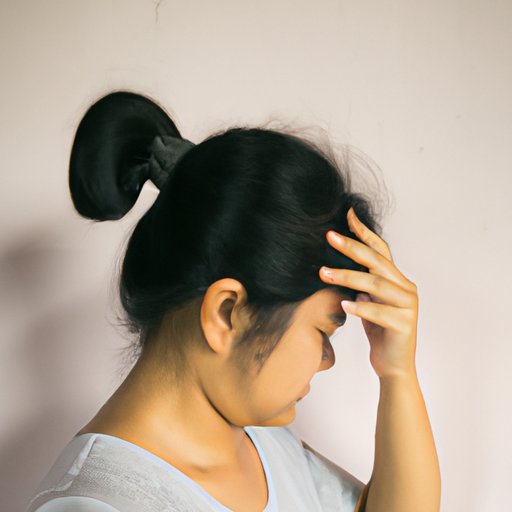Introduction
Exercise has many health benefits, from improved physical fitness to enhanced mental wellbeing. However, it is not uncommon to experience a headache after exercising. In fact, exercise-induced headaches are one of the most common types of headaches, affecting up to 20 percent of people who exercise regularly.
This article will explore the potential causes of exercise-related headaches, their physiological effects, and how to prevent and treat them. We’ll also examine the link between exercise and stress headaches, as well as the role of hydration in preventing headache pain.
Analyzing the Causes of Exercise-Related Headaches
There are several potential causes of exercise-induced headaches. Physical exertion, hormonal changes, stress, and dehydration all play a role in the development of these types of headaches.
Physical exertion is a common cause of exercise-related headaches. When we work out, our heart rate increases, which can lead to increased blood pressure and tension in the head and neck muscles. This can cause headaches that can range from mild to severe.
Hormonal changes can also contribute to exercise-related headaches. During and after exercise, our bodies produce hormones such as adrenaline, cortisol, and endorphins. These hormones can cause changes in blood flow, leading to increased pressure in the head and neck muscles, which can trigger headaches.
Stress is another potential cause of exercise-related headaches. Stress can cause muscle tension and tightness in the head and neck, leading to headaches. Additionally, stress can lead to poor sleep, which can further exacerbate headache pain.
Dehydration is another potential cause of exercise-related headaches. When we exercise, we lose fluids through sweat and respiration. If we don’t replace these fluids, our bodies become dehydrated, which can lead to headaches.

Examining the Physiological Effects of Exercise on Headache Pain
Exercise can have a profound effect on headache pain. For example, physical activity increases blood flow to the head, which can make existing headaches worse. Additionally, when we exercise, our bodies produce endorphins, which are natural painkillers. Lower levels of endorphins can lead to increased headache pain.
Exploring How to Prevent Exercise-Induced Headaches
Fortunately, there are several ways to prevent exercise-related headaches. First, it’s important to warm up and cool down properly before and after each workout. This will help to reduce muscle tension and prepare your body for exercise. It’s also important to stay hydrated before, during, and after exercise. Drink plenty of water and electrolytes to keep your body from becoming dehydrated.
It’s also important to avoid overexertion and fatigue. Pushing yourself too hard can lead to increased muscle tension and headaches. Finally, it’s important to listen to your body. If you start to feel a headache coming on, take a break or stop exercising altogether.
Considering Possible Treatments for Exercise-Related Headaches
If you are experiencing an exercise-induced headache, there are several possible treatments. Over-the-counter pain medications, such as ibuprofen, can help to alleviate headache pain. Additionally, natural remedies such as aromatherapy and massage therapy can help to relax tense muscles and reduce headache pain.

Understanding the Link Between Exercise and Stress Headaches
Stress headaches are another type of headache that can be triggered by exercise. The relationship between physical and mental stress is complex, but it is thought that physical exertion can increase mental stress, leading to tension-type headaches. To help manage stress, it’s important to practice relaxation techniques such as deep breathing and progressive muscle relaxation.
Investigating the Role of Hydration in Exercise-Related Headaches
Hydration is key to preventing exercise-related headaches. When we exercise, our bodies lose fluids through sweat and respiration. If we don’t replace these fluids, our bodies become dehydrated, which can lead to headaches. Symptoms of dehydration include dizziness, fatigue, and headache pain. To prevent dehydration, it’s important to drink plenty of water before, during, and after exercise.
Comparing Types of Exercises That May Cause Headaches
Different types of exercises can have different effects on headache pain. High-intensity workouts, such as running and weight lifting, can increase blood pressure and trigger headaches. Low-impact exercises, such as yoga and swimming, can help to reduce headache pain. Cardiovascular activities, such as biking and jogging, can also help to relieve headache pain.
Conclusion
Exercise-related headaches are a common problem for those who exercise regularly. In this article, we explored the potential causes of exercise-related headaches, their physiological effects, and how to prevent and treat them. We also discussed the link between exercise and stress headaches, as well as the role of hydration in preventing headache pain. Finally, we compared different types of exercises that may cause headaches.
To manage exercise-related headaches, it’s important to warm up and cool down properly before and after each workout, stay hydrated, avoid overexertion and fatigue, and listen to your body. Additionally, over-the-counter pain medications, natural remedies, and massage therapy can help to alleviate headache pain. Finally, it’s important to practice relaxation techniques to manage stress and reduce tension-type headaches.
(Note: Is this article not meeting your expectations? Do you have knowledge or insights to share? Unlock new opportunities and expand your reach by joining our authors team. Click Registration to join us and share your expertise with our readers.)
